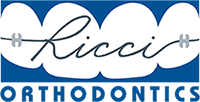Permanent Retainers
 When your braces are removed, Dr. Steven Ricci will suggest either a permanent or removable retainer to keep your teeth in alignment. The main difference between a removable and permanent retainer is how you wear them. A permanent retainer will attach to the back of your lower front teeth to guard your teeth against shifting 24 hours a day. Removable retainers are usually only worn at night and are obviously only effective when they are worn. Dr. Steven Ricci has experience with both types of retainers and will determine which one is best suited for you.
When your braces are removed, Dr. Steven Ricci will suggest either a permanent or removable retainer to keep your teeth in alignment. The main difference between a removable and permanent retainer is how you wear them. A permanent retainer will attach to the back of your lower front teeth to guard your teeth against shifting 24 hours a day. Removable retainers are usually only worn at night and are obviously only effective when they are worn. Dr. Steven Ricci has experience with both types of retainers and will determine which one is best suited for you.
The Benefits of Permanent Retainers
The idea of needing to wear a permanent retainer after removing braces causes many patients to avoid using a permanent retainer. Before eliminating a permanent retainer as an option, consider some of its benefits:
- Permanent retainers have more aesthetic appeal than their removable counterparts. The placement of the retainer behind the teeth keeps the retainer from being noticed by others. Its hidden nature allows you to smile and talk without feeling self-conscious.
- They are more convenient to use. Permanent retainers eliminate the need to remember to keep placing it in your mouth. You will also not need to worry about replacing the retainer.
- The long-term results are better when using a permanent retainer. Removable retainers are worn for less time, allowing more opportunity for your teeth to shift. It is impossible to know how teeth will shift; however, permanent retainers make the possible shifting of teeth less of an issue.
When using a permanent retainer, it is important to know proper dental hygiene techniques to remove bacteria and food from the retainer. Using these techniques will help you to avoid gum disease and tooth decay. Permanent retainers are the ideal choice for patients who adhere to proper care techniques.
Why Would Someone Choose this Option?
The idea of needing to wear a permanent retainer after removing braces causes many patients to avoid using a permanent retainer. Before eliminating a permanent retainer as an option, consider some of its benefits:
- Permanent retainers have more aesthetic appeal than their removable counterparts. The placement of the retainer behind the teeth keeps the retainer from being noticed by others. Its hidden nature allows you to smile and talk without feeling self-conscious.
- They are more convenient to use. Permanent retainers eliminate the need to remember to keep placing it in your mouth. You will also not need to worry about replacing the retainer.
- The long-term results are better when using a permanent retainer. Removable retainers are worn for less time, allowing more opportunity for your teeth to shift. It is impossible to know how teeth will shift; however, permanent retainers make the possible shifting of teeth less of an issue.
When using a permanent retainer, it is important to know proper dental hygiene techniques to remove bacteria and food from the retainer. Using these techniques will help you to avoid gum disease and tooth decay. Permanent retainers are the ideal choice for patients who adhere to proper care techniques.
Why Would Someone Choose this Option?
Permanent retainers are ideal for anyone using other dental devices, people who do not wear their retainer as directed, or people who might forget or lose a removable retainer. In these situations, a permanent retainer is the best option because it will ensure that the retainer is worn and deliver better results.
Permanent retainers are not ideal for the person who does not follow required oral hygiene techniques. These types of retainers are harder to clean. Not cleaning them properly could result in tooth decay. Permanent retainers aren’t necessary for patients with a low risk of teeth shifting.
How Do I Care for My Permanent Retainer?
The most important part of permanent retainer care is remembering to practice thorough oral hygiene. Brushing your teeth and flossing are more difficult with permanent retainers, leading to an increased risk of gum disease and cavities. Make sure to brush and floss often.
Do not eat the foods you avoided while you wore braces. Avoid overly sweet, hard, and sticky food. Eating these types of food can increase your chances of damaging your retainer and risk of oral health issues such as cavities. If your permanent retainer no longer fits or breaks, please contact Dr. Steven Ricci immediately.
How Long Will I Have to Wear a Permanent Retainer?
Even though the name suggests it, you may not have to wear a permanent retainer forever. Although it is possible you will need to wear a retainer for the rest of your life, you may ultimately switch from a permanent retainer to a removable retainer. The change to a removable retainer usually occurs to help protect a patient’s oral health since cleaning around permanent retainers is much more difficult.
You can learn more about a permanent retainer by calling or texting Ricci Orthodontics at (678) 263-8695 and scheduling an appointment with our orthodontist.
Call or Text Ricci Orthodontics today for high-quality treatment!
Current Patient:
(678) 263-8695
New Patient:
(678) 263-8695
Our Location
Ricci Orthodontics
10475 Medlock Bridge Rd, Suite 114
Johns Creek, GA 30097
Call or Text
Current Patient:
(678) 263-8695
New Patient:
(678) 263-8695
Our Hours
Monday: 7:30AM – 5:00PM
Tuesday: 7:30AM – 5:00PM
Wednesday: 9:00AM – 5:00PM
Thursday: 7:30AM – 5:00PM
